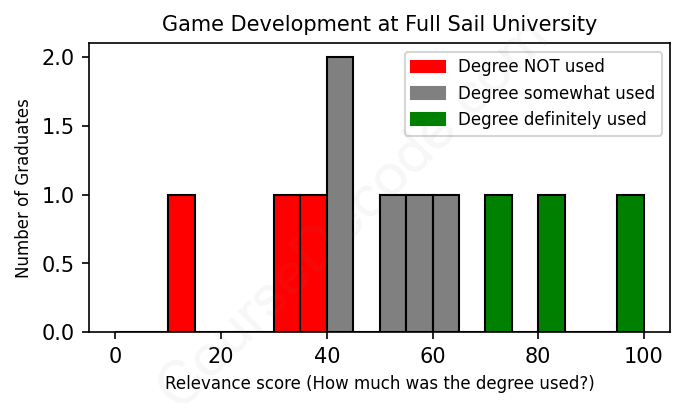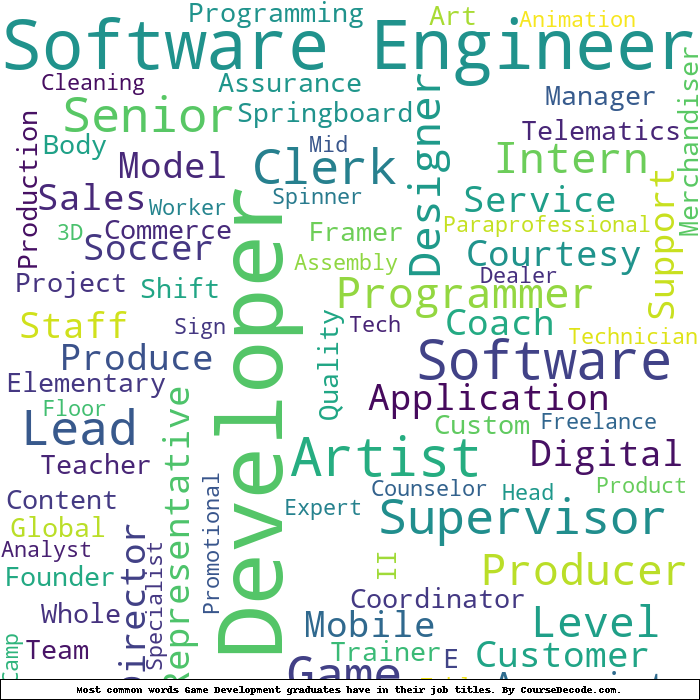
First, some facts. Of the Game Development graduates from Full Sail University we've analyzed , here's how many have used (or NOT used) their degree in their career:

These are estimates based on AI analysis of 11 LinkedIn profiles (see below).
The verdict? Significantly below average. Overall, with an average relevance score of 53%, Game Development graduates from Full Sail University have a much lower likelihood (-14%) of finding work in this field compared to the average graduate across all fields:
And for comparison, here's the chart for all profiles we've looked at across all degrees.
Also, after graduating, only 27% of these graduates have pursued further education other than another Bachelor's degree (such as a Masters degree or other), compared to the average across all profiles of 35%. This suggests a Bachelors degree is enough for most Game Development graduates, and it's normal to look for work straight after graduation.
See the details:
|
Relevance score: 36% We think this person has NOT gone into a career related to their degree. We think this person has NOT gone into a career related to their degree.
DEGREE INFOGraduated in 2014 from Full Sail University with a Bachelor of Science (B.S.) in Game Development. Also pursued further education since (see below). JOB HISTORY SINCE GRADUATIONLead Producer Incendiary Entertainment Division (I.E.D.) Mar 2015 - Feb 2016 Table Games Dealer  FireKeepers Casino Hotel Aug 2016 - Dec 2019 Floor Supervisor  Harrah's Hoosier Park Dec 2019 - Present FURTHER DEGREES DONE SINCE GRADUATINGMaster of Science (M.S.)Full Sail University 2015 - 2015 ABOUTUpon finishing my degrees, I returned home to be with my grandmother. I went into the Casino Industry as a dealer and excelled quickly. Since then, I've pushed to further my career in this industry and move forward. |
The top 10 most common jobs done by the graduates we've analyzed (ranked most common to least) are:
From the analysis of LinkedIn profiles of individuals who studied Game Development at Full Sail University, it seems that many of them have landed jobs closely tied to the gaming industry. The most common roles include positions like Software Engineer, Game Programmer, and Game Producer. These positions are definitely relevant and utilize the technical skills, programming knowledge, and overall game development principles taught in their degree. For example, jobs at major gaming companies like Electronic Arts and 2K Games show that some graduates are working directly in game development, honing the skills they worked hard to acquire.
However, there’s also a surprising number of graduates who ended up in roles that don’t relate directly to game development. Jobs in fields like healthcare technology, retail, and customer service appear frequently, indicating that some graduates have diverted from their intended career paths. While many of these roles may utilize technical or transferable skills from their degree—like programming or problem-solving—the direct application of their game development education is often minimal. So, while a good chunk of these graduates have found success in relevant gaming jobs, quite a few have taken on roles that don't fully align with their original goals, which is something to keep in mind for anyone looking to enter this field.
Here is a visual representation of the most common words in job titles for Game Development graduates (this is across all Game Development graduates we've analyzed, not just those who went to Full Sail University):

Looking at the career trajectories of Full Sail University graduates in Game Development, there's definitely a mixed bag of outcomes. For many, their first job post-graduation tends to be in programming or quality assurance, like the folks who went on to work for companies such as Electronic Arts and 2K Games. It seems that a good number of these graduates land roles that are directly tied to game development right out of the gate, which is encouraging and speaks to the strength of the program. As they progress, we see some moving up the ladder to positions like senior software engineers or tech leads, indicating a positive trend toward establishing themselves in the gaming industry.
However, not everyone stays on the game development track. For some graduates, we see a shift into unrelated fields, like healthcare technology or even retail positions. It's notable that a few have ended up in roles that seem a far cry from gaming, like customer service or e-commerce management. This is a bit of a reality check; while many have found success in gaming, there are those who, after several years, diversify into other careers unrelated to their initial training. Overall, while there are certainly promising paths, graduates should be prepared for various outcomes as they navigate their careers in this industry.
Honestly, a Bachelor degree in Game Development, whether at Full Sail University or somewhere else, can be pretty challenging, but it really depends on your interests and skills. You're diving deep into complex topics like programming, design, and art, which means a lot of hours spent on projects, learning new software, and sometimes dealing with frustrating bugs—so it's definitely not a walk in the park. If you love gaming and have a passion for creating, it can be super rewarding, but be prepared to put in the work. It's generally considered harder than a lot of other degrees, mainly because of the combination of technical skills and creativity needed, so just be ready to roll up your sleeves and really commit!
Most commonly, in the LinkedIn profiles we've looked at, it takes people 2 years to finish a Bachelor degree in Game Development.
Looking at these Full Sail grads, it seems like some have really hit their stride while others are still figuring things out. The ones who started off as programmers at big companies like EA and 2K Games probably pulled in decent salaries, especially as they moved up the ranks to roles like Senior Software Engineer. On the flip side, a couple of the graduates from 2014 appear to have taken some oddball job paths, sticking to roles in retail or lesser-known positions for quite a while. Overall, I’d say the gaming industry can be lucrative for those who find their place in it, while others might still be chasing their dreams or finding the right fit, which can make it seem like a mixed bag when it comes to making decent money. It all really depends on the path they took after graduation!
Here is a visual representation of the most common words seen in the "about" section of LinkedIn profiles who have a Bachelor degree in Game Development (this is across all Game Development graduates we've analyzed, not just those who went to Full Sail University). This may or may not be useful:

Here are all colleges offering a Bachelor degree in Game Development (ordered by the average relevance score of their Game Development graduates, best to worst) where we have analyzed at least 10 of their graduates:
| College | Score | Count |
|---|---|---|
 Full Sail University Full Sail University
|
53 | 11 |